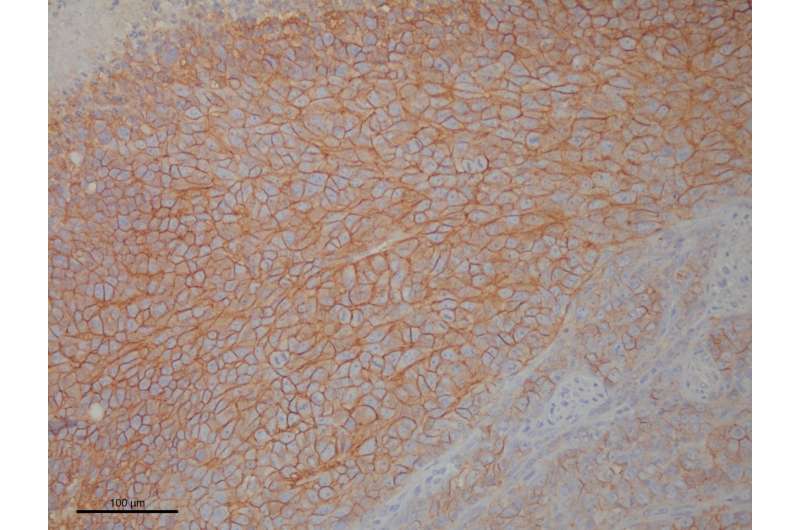Unique research approach finds FDA-approved drug shuts down Ewing sarcoma cells in lab

Based on a novel approach to drug discovery, researchers at Georgetown Lombardi Comprehensive Cancer Center say an agent approved to treat a type of leukemia might also help young people with a much rarer and aggressive form of cancer, Ewing sarcoma.
The findings, reported in Oncogene, mean that the drug, clofarabine (Clolar) soon could be tested in a clinical trial for Ewing sarcoma, a cancer found in bone or soft tissue. It predominately affects young people between the ages of 10 and 20, and while survival can be as high as 70 percent, treatment-related side effects can produce second cancers, heart problems and infertility.
"Our goal is to improve both survival and quality of life for Ewing sarcoma patients, and this drug, when used in combination with other therapies, may do the trick. Our work also provides the knowledge on how to make safer derivatives with fewer side effects for Ewing sarcoma patients," says Aykut Üren, MD, associate professor of molecular biology at Georgetown University School of Medicine and a member of Georgetown Lombardi.
Üren worked with a team of investigators from Georgetown Lombardi, and from Italy and Turkey.
The researchers chose a druggable target protein, CD99, which is significantly expressed in Ewing sarcoma cells. CD99 is a transmembrane protein—one end sticks out on the cancer cell surface and the other end is inside of the cell. In fact, making an Ewing sarcoma diagnosis depends on both the appearance of the cell under the microscope and the fact that these cells express CD99 protein. Investigators don't know exactly what CD99 does but earlier research using experimental monoclonal antibodies that bind on to, and inhibit, CD99 stopped tumor growth in laboratory models.
The team took what they say is an unconventional approach to searching a National Cancer Institute database of 2,607 compounds to find one that could potentially help Ewing sarcoma patients. They didn't tailor the search based on finding the right molecule that perfectly fits into a pre-selected groove in the structure of CD99, but looked to see if anything would bind anywhere on the protein. They then looked at what happened when these molecules stuck together.
They found 150 compounds that could link on to CD99, but only two had a beneficial function. One was clofarabine and the other was another FDA approved drug, cladribine (Leustatin) used to treat hairy cell leukemia, B-cell chronic lymphocytic leukemia and multiple sclerosis.
Üren says that while both drugs "drastically" inhibited growth of Ewing sarcoma cells in lab and animal studies, clofarabine "decimated" the cancer.
The study also revealed that when the two FDA approved drugs bind on to CD99, they work both on the outside and inside. "It is the inside action of the drugs—their ability to alter DNA metabolism—that produces the known toxicity associated with them," Üren says. "We believe it is sufficient to act only on the outside of the protein to kill Ewing sarcoma cells. Therefore, a derivative of clofarabine—just the part that latches onto CD99 without activating it—would likely work very well in the treatment of Ewing sarcoma." But he adds that clofarabine in its existing form should, and could, soon be tested as a treatment.
Üren adds that the study offers tantalizing clues that inhibiting CD99 may work as treatment for other cancers or for a number of immune disorders that display these proteins.














